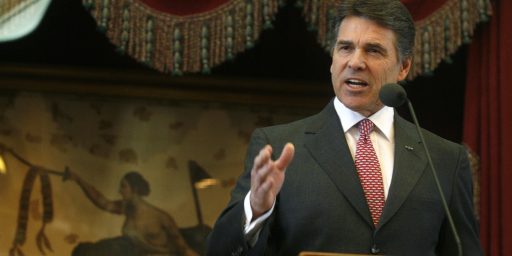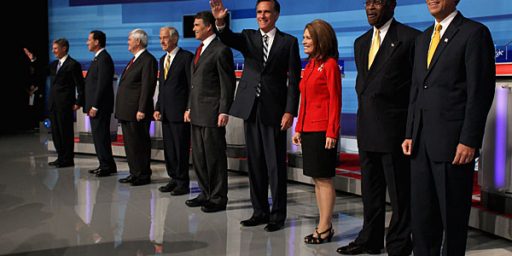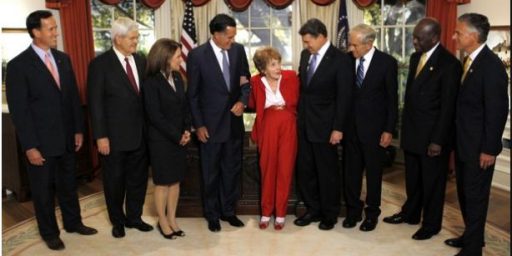Charts of the Day: Miracles Edition
More on Texas and jobs.
 Via Paul Krugman:
Via Paul Krugman:

Yes, I know a lot of you don’t like Paul Krugman. However, said dislike really doesn’t negate the data.
The issue at the moment, to me, is understanding the rather dramatic claims. If Texas is, in fact, doing something right, I want to understand what it is and, likewise, if Perry is blowing smoke about a Miracle, I want to understand that as well. The chart about shows that the unemployment rate in Texas largely mirrors two fairly liberal, high tax, high regulation states. This fact would tend to negate the notion that Texas has the magic formula for job creation because of its low tax, low regulation environment. At a minimum it should lead one to ask questions.
But, of course, the focus has been on raw job creation numbers. However, as Krugman (and the WSJ) points out: much of the jobs added in Texas have come because of increased population. Indeed, the state grew more in the last ten years than any other state. This has led to more demand in the state (and, ironically, to an increase in public sector employees). From the WSJ: “Employment in the state’s public sector has jumped 19% since 2000, compared with a 9% rise in the private sector.” This is especially ironic since
Mr. Perry has tended to play down the magnitude of government hiring, maintaining that the government’s economic role is to create a favorable climate for private businesses. “Government doesn’t create any jobs,” he said last month on Glenn Beck’s show on Fox News. “They can actually run jobs away.”
See the following:

It would be nice if we actually if we could have a real discussion about these things instead of reducing them to simplistic slogans (let alone making half-true claims about a pretend reality).
The real political risk for Perry is whether the effects of various cuts, especially to education jobs, becomes sufficiently visible to the public going into primary season. If Texas’ unemployment rate climbs or the job numbers in any way deflate it could take the steam out of the “Texas Miracle” narrative.






Steven, I’m afraid that Perry is looking to lead the party of “Pretend Reality”. And the sad truth is that people who don’t like Democrats will still vote for a Republican no matter how crazy he is. I think it was Rosa Parks who once pointed out that if a white man and a black man were walking down the road, the white man so drunk he was stumbling and falling, the black man walking firm but with a hint of whiskey on his breath, the reaction of most whites of the era would be to say to themselves “look at that undisciplined drunken negro”. So it is with most people who have voted Republican in the past. There is literally nothing that the Republican party leadership can do that will cause these loyalists to hold their nose and vote Democratic.
Steven, the truth is there are very few options for state governments to reverse an economic tide global in scope. Monetary and fiscal policies (actually they are one and the same) of sufficient magnitude can ultimately come only from D.C. So regardless of how the Texan economy is doing, Perry desreves very little credit for it.
@Ben Wolf: I concur. Indeed, my point is to illustrate that the claims of some policy-specific miracle that emanated from the Governor’s Mansion in Austin are problematic (to say the least).
Yea, we are still waiting for Jan to produce something besides vaporware on this issue. Or anyone else for that matter.
@anjin-san:
This is one of the biggest fallacies of what passes for conservative thought in these lesser days. That if a specific policy (tax cuts, no regulation etc.) is made permanent then all will be well. They either cannot understand or cannot accept that good governmental economic policy doesn’t resemble a marble statue, it looks more like a balancing act high up on the wire, and must be capable of quickly adapting to changing circumstances. Unfortunately we currently have a party devoted to ensuring government is totally paralyzed.
If it looks too good to be true, it probably is.
You could look at this the other way. The fact that their unemployment numbers aren’t much, much worse despite a growing population. Or that its population has grown precisely because the jobs have been created. Do we think that people are choosing Texas to move to because they want to experience its excruciating heat? Maybe they’re drawn by the completely flat terrain. Maybe it’s that fresh Houston seabreeze or because Corpus Christi is so lovely this time of year.
But for the jobs (or, if you really want to go there, low taxes), why the hell would anybody move to Texas? You ask me, that’s a bigger miracle than the supposed economic miracle that Perry allegedly created.
As I mentioned in my comment on the previous post, if an unemployed person in Louisiana relocates to Texas to find work, you have just lowered Louisiana’s unemployment rate and raised Texas’s. That Texas’ remains in the middle, despite its growing population, might be seen as a point in its favor.
I am more easily sold on the notion that it’s despite Perry rather than because of him that Texas is still doing reasonably well, or that it’s just dang luck, than I am that Texas isn’t doing well, all things considered.
@Ben Wolf: Ben, I would take it a step further. Nations are so connected and intertwined in this global economy that there is little one nation can do. The failure of one too big to fail bank in France could easily take down the entire world financial system.That almost happened in 2008 but in 2011 there will be no bailouts. All of the TBF banks are still insolvent but because of creative accounting we don’t really know how insolvent.
@Trumwill: I am not saying that there aren’t reason to move to Texas. Despite your description, it is actually a pretty pleasant place to live. And, in fact, a lot of people from northern states do move to the sunbelt for its climate (not just Texas). The Austin area, for example, has long been considered one of the most attractive places to live in the country.
The question at hand is whether there is some truly remarkable policy move made by Perry that has created jobs and that can be replicated at the national level.
Texas’ population started growing well before Perry was governor, so he can hardly claim that one. And yes: the lower taxes and lower regulation are business friendly, but do we see a jobs situation that is truly unique? I am not so sure. Beyond that, do we see a policy that would work on the national level? This strikes me as rather unlikely (although if I am missing something, please let me know).
@Steven L. Taylor: No, you’ve got it about right Steven. Taxes are an important economic tool, but in our current situation tax cuts will be of minimal value.
There are effectively two sectors to our economy: government and private. Both cannot be net savers or spenders at the same time without wrecking the economy. As we’re in a ballance-sheet recession everyone in the private sector is trying to deleverage (pay down debt) by saving rather than spending. Saving pulls money out of circulation, weakening the economy and generating deflationary pressure. Perry’s policies in Texas can have absolutely no bearing on how to deal with such a scenario.
Well of course…I mean, any person or group that seriously believes that the budget can be fixed with spending cuts alone…
Steven,
Let me apologize for the stridency of my previous comment. On the basics, I think that you and I are at least partially agreed (I don’t think Perry performed a Texas miracle). I think the main subject of my irritation is Krugman himself. He seems bound and determined to portray Texas as something that (from my perspective) it doesn’t seem to be. He seems to be vested in the notion that Texas is some sort of failed state (I think because a state that follows the policies it does must be a failure, or really unimpressive, or something).
As for Texas’ other attractions, I guess I just don’t see it. Austin may be nice, but it’s the exception (no offense to your home state). What exactly is it that attracts people to Houston? Dallas? Both are growing extraordinarily. If not for jobs, then for what? It’s Florida without the nice beaches and more pollution.
If it’s weather, why so many to Texas compared to Louisiana, Alabama, Mississippi, and so on? Because if it’s not jobs, which may or may not be the product of policy, it must be because Texas is doing something else right. I am genuinely puzzled as to what that might be.
@Trumwill: What are the demographics for Texas’ population growth?
A lot of Texas’ population growth comes from the south, of course. But when you look at interstate migration, the difference between inbound and outbound is pretty striking.
@Trumwill: If the demographic is elderly, they’re likely relocating due to cost of living. If they’re poor, they’re likely moving due to cost of living. I’m willing to bet there aren’t large numbers of wealthy moving to Texas, because they have relatively little to gain.
Or it could be a case of Okies movin’ out Californie way, on the rumor of economic opportunity.
I do think that cost of living is likely part of it, though I think that’s an area where policy actually does play a role. I don’t think that you have to be poor or retired for that to matter, though.
I guess my views are somewhat colored by my recent trip through. It seemed that everybody was hiring and having trouble filling their spots. I haven’t seen anything like it since the Great Recession started. Seattle being the closest thing to it. It’s probably the first place I would start looking for work, if I were a free agent.
I certainly wouldn’t be going down for the weather. That’s for sure. That’s not how humans are meant to live.
Doug Mataconis wrote a compelling thread about Rick Perry soon after he announced his candidacy. In it he cited numerous references to ‘problems’ and issues with Perry’s record. I looked a number of them up, following not only Doug’s links, but finding my own. I also asked some other people, more knowledgeable about Perry, what they knew of certain accusations.
Then today I ran across this piece, which is so detailed, researched and resourced, that it compliments Dougs commentary, adding more information to the questions that arose from his initial inquiry into what kind of a governor and man Perry is.
The various issues covered are his executive order relating to Gardarsil vaccine, the Trans-Texas Corridor, being a former democrat, secession, jobs, cost of living as it relates to wages (an amazing comparison to NYC and Los Angeles), education as it relates to rankings in the U.S., refusing federal stimulus money, what and where he has raised taxes, and more. Most of the time the devil is in the details, whether it relates to a policy, piece of legislation, or the background of a person. This article certainly provides some interesting details about Perry, lifting some of the rumors that have ignited around his entrance onto the political scene.
17 things that critics are saying about Rick Perry
“If it’s weather, why so many to Texas compared to Louisiana, Alabama, Mississippi, and so on?”
Texas is not Louisiana or Alabama. In fact, a very important point missing here is that the population of the cities in the MEXICAN side of border are also exploding(Or were, until Calderon decided to use the Army against the Drug Cartels). Ciudad Juarez is something like four times bigger than it was twenty years ago.
A big part of this population growth comes from Hispanics. I find difficult to take out “Mexico” from this Texas Miracle.
@jan:
I see that website also has content for children. A family site you might say.
http://peskytruth.wordpress.com/2011/06/01/obama-has-grits-at-flos-cafe/
@MarkedMan:
That is such a tacky, biased generalization. The Rosa Parks comment does no justice to Parks, either, in exploiting her justified comment, set in the era of raunchy Jim Crow laws, as some kind of moral equivalency to simply reflect your distaste for a party ideologically different than you.
Why don’t you simply do a comparison of Perry’s jobs creation stats versus Obama’s, Taylor? Oh, wait. that would be too much apples and apples. What you want is apples and anything that you can cite/create/distort to pull the facts around to making your guy look less than an abject failure by comparison.
As they say; lies, damn lies, and statistics…
By the way, you might want to go easy on quoting material from a guy who advocates convincing the world we’ve been invaded by aliens from outer space as a means of stimulating the economy. You should reconsider the idea of following him onto that shiny grand carousel that is forever twirling in the circus of the liberal mind.
@Scott O.:
Well I guess the Peskytruth just doesn’t pack a one-punch commentary. However, what you posted is not what I posted, was it. The one linked by me was a serious political analysis, complete with links and sources, rather than a whole other one which appears to be a satire in nature.
BTW, what’s your point…?
@Gulliver:
Tying in with your comments on Krugman —-> Paul Krugman still wrong about Texas
@jan:
Wasn’t it obvious? IMO, the blogger at Peskytruth is an immature jerk.
@jan:
jan, which part is a generalization? The part about the Republican leadership holding crazy views and doing crazy things? That’s not a generalization, that’s my viewpoint of the Republican leadership, i.e. the top thirty or so most influential and powerful Republicans. Or do you mean about how people who have consistently voted Republican in the past won’t give up voting for them no matter how crazy things have gotten? That is a generalization, based on my perception, which means, since I don’t have the statistics to back it up, it’s biased. So, if that’s what you meant, then you are right. I’ll leave it to others to decide if it was tacky.
@André Kenji de Sousa: That’s interesting about the Mexican border towns.
As I said to Ben, even looking at interstate migration, Texas still seems to be pulling in quite a few people. And even among non-Hispanics, its population growth rate between 2000 and 2010 (10.6%) is over twice that of Alabama’s, New Mexico’s, and that of the United States as a whole, all of which at about 5%.
None of this is to say that there is no impact coming in from the south, though taking that into account seems to make Texas look better rather than worse (comparing Texas’s unemployment numbers with those of other high-immigration states, for instance, as well as less job-based issues like income, insurance, and education).
But look, if you want to argue that there’s no miracle, I don’t take issue with that. As Norm says, if something looks too good to be true it probably is. But (for whatever reason) things look pretty good from where I am sitting, comparatively speaking. Does Rick Perry have anything to do with that? I am inclined to say no, but I don’t like Rick Perry and so of course that is what I would be inclined to say.
Texas pulls in people because the cost of living is fairly low, particularly for housing. It can draw a boom of folks from parts east and west who can afford to buy the housing, offset by the large influx of cheap labor.
And what kind of “miracle” is it if wages don’t actually go up? There is no appreciable increase in wages in Texas, which would indicate an increase in highly skilled labor. Texas ranks quite highly against other states with regard to people just earning the minimum wage. That’s nothing to be proud of. Plus, the job growth is barely enough to keep up with its own population growth.
@Anonne:
Cost of living is certainly a part of the equation, but cost of living is low in lots of places that aren’t pulling in nearly the number of people that Texas is. Also, it’s because of the low cost of living that wages don’t need to be nearly as high in Texas as in elsewhere. When you look at median household income, Texas doesn’t do very poorly. It’s hard to look at minimum wage jobs and sub-minwage jobs without taking into account Mexican immigration. So this is a genuine question: Where do California, Arizona, and Nevada rank?
I have yet to be convinced that keeping up with the population growth is not in itself an achievement, all things considered. If you look at all of the states with growth rates above 15%, only one (Utah) of the nine has an unemployment rate lower than Texas’. So even if Texas’ growth rates have nothing to do with jobs or the prospect of jobs, it seems to be doing a better job of finding them work than similarly growing states.
When people vote with their feet, that is a pretty significant vote.
I think the immigration data supports the Texas Model. That is, a fairly tech critical mass in a land with cheap houses, low taxes, and (yes) low services attracts businesses and workers from other states.
Conservatives wanted to take the Texas model national in the last elections, and there’s no reason they can’t try again, with Perry as figurehead for the movement.
It isn’t necessary for me that Perry have invented the “miracle” in order to sell it.
Hey, I spotted another loophole. Note that bottom chart cites “local government” employment has gone up 21%. That means county, city, and town governments. That is the level of government below Perry, where he has little to no say. I would be intensely curious to see the statistics of “state government” employment.
J.
@Gulliver:
Of course, the problem is that a comparison of a state economy to the national one isn’t apples to apples. While the first chart above (state to state) is apples to apples.
Indeed, the fundamental question in all of this is whether there are state-level policies that can be translated to the national level.
Two other points:
1) The unemployment rate in Texas in 8.2% and the national rate is 9.2% The difference is not that large (and hardly the stuff of miracles).
2) If we are going to play the crude game of “the executive gets the credit for jobs created” as in “Perry gets the credit for the jobs created in Texas during his tenure” then, likewise, if you want to do a state to national comparison, Obama gets the credit for the Texas jobs, too. Because, after all, he was chief executive of the nation during the period of time that Perry is crowing about.
From Jan’s link…
So at least we know she is having her opinions made for her by un-biased sources…as usual.
@Tea Parties are for Little Girls (formerly Hey Norm): You rarely see that kind of honesty in opinion on the left, so I’m not surprised that you don’t know how to deal with it.
And I thought you were in the “Tea Party terrorists” camp, the “Tea Party is destroying America” crowd. What’s it like to get your ass kicked by little girls? (Cue up appropriate scene from the movie “Kick-Ass”)
J.
courtesy of institute on taxation and economic policy…via yglesias…another chart that shows the tax impacts on the poor in texas.
http://thinkprogress.org/yglesias/2011/08/15/296079/taxing-the-poor-in-texas/
JTea…
Clearly a first for you. It gets better…as they say.
“And even among non-Hispanics, its population growth rate between 2000 and 2010 (10.6%) is over twice that of Alabama’s, New Mexico’s, and that of the United States as a whole, all of which at about 5%.”
New Mexico is a much smaller state(And has a worse climate) and in fact has a smaller border with Mexico. Mexican immigration helps to fuel economic activity, that provides jobs to nonwhites. In the Mexican states of Coahuila e Taumalipas it´s common to talk of Texas as the other side of the border, Texans say the same of these parts of Mexico. There are growing international metropolitan areas all over the border in Texas(El Paso-Ciudad Juarez, Laredo-Nuevo Laredo, McAllen-Reynosa), but in fact there is a international economic corridor next to border(In some sense, Sonora, Chiahuhua, Nuevo Léon, Taumalipas are Mexico´s Texas). Anything traveling by land from Mexico to Chicago or New York must travel thru Texas, by the way.
Perry has a great claim to Texas´ success: he never pandered to nativists on this issue. But I don´t know if that´s something that tea parties and conservatives in the GOP will like.
PoliticalMath makes an interesting point about the Fed Jobs being linked to Census Work. He also has some interesting data on other points of contention. He totally ignores the stable housing market that makes TX so attractive to so many who need to move and are looking for a job. http://www.politicalmathblog.com/?p=1590
@Scott O.:
I bet you didn’t even read the author’s analysis of Perry, did you? Instead, you find another red herring, non-relevant article, and use that as a template to cast your aspersions on the one that was posted. It makes your comments irrelevant and based on nothing. What was so difficult to give a forthright assessment of what was linked?
BTW, the way you responded is a passive aggressive way to engage in honest-based political discourse.
What makes Texas different from many of its neighbors is the lack of income tax. Low housing cost with lack of income tax is certainly a boon for migrants, and the cheap labor and relatively low regulation makes it friendly for businesses. Mind you, however, it is Texas’ mortgage regulations that insulated it from the housing fiasco and prevented the kind of debt overhang from hitting them as hard as other states.
@Steven L. Taylor:
The unemployment rate in Texas in 8.2% and the national rate is 9.2% The difference is not that large (and hardly the stuff of miracles).
Paul Krugman seems to think that the .6% difference between Massachusetts and Texas is “significant”.
Anyway, I still maintain that having an unemployment rate even modestly below the national average is pretty impressive considering the population growth rate. As I pointed out above, of the 9 other states with 15% growth between 2000 and 2010, only one (Utah) has an unemployment rate lower than Texas’, with most above the national average. Texas, along with Utah and Colorado, appear to be an exception to this trend.
(I agree that comparing national and state numbers is problematic, though.)
Enjoy, Perry bashers.
http://www.politicalmathblog.com/?p=1590
By the way, this whole meme fascinates me. To use a golf analogy. A guy who’s never broken 100 in his life looks at the guy who just shot 74 and says, ” yeah, but you didn’t shoot 68, and you bogeyed the 18th……….you suck!”
Preposterous on its face.
@ Drew,
I’ve spent some time reading that blog…and while intrigueing, it has some problems.
One: The Blog sets up a strawman about low paying jobs. He then points out that the median wage is $15.14 – about the middle of the pack. What he does not say is that nearly 10% of workers earn the minimum wage or less – which is well above the national average. For comparison, in Mass. it’s $18.10.
Two: The Blog says this:
The problem with this is that we know that many of the jobs have been poached from other states, so in fact a large number of people are moving to Texas for jobs they already have lined up.
Three: The Blog spends a lot of time comparing current employment to pre-recession…which doesn’t make sense to me given the large amount of growth. Growth brings jobs with it by bringing more DEMAND.
Now, I am not an economist. While I do find much of The Blogs argument compelling I do not think it is iron-clad by any means. I await a critical analysis by someone more qualified.
FHN –
If its so damned bad, why are people going there…………..and leaving Mass, MI, IL, OH, PA……..etc.
Facts, and people voting with their feet are hard things to ignore. Obama views IL and MI as the perfect model. Your man is a failure, and this trend will only continue. Don’t listen to me. Watch actual people making real life decisions. Empirical evidence is a bitch.
@Trumwill:
Until mid 2006, Texas had the second highest unemployment rate among the 10 states with a 15% growth between 2000 and 2010. And at the end of 2007 four of those states still had lower rates than Texas. The rise that then started in 2008 wasn’t as long and as steep in Texas as in most of the other states in the 15% growth rate group.
From that I’d argue that you can make the argument that you are.
@ Drew..
Right…I admit the guy has a compelling argument, and try to make a cogent argument about flaws I see in the blog…and your response is: :…Your man is a failure, and this trend will only continue…” Well yeah…since the trend started well before “my man” became President.
Bottom line is you found someone to back up your point of view, and you’re sticking with it no matter what. It’s called epistimic closure, and it’s why having a discussion with you or Jan or JTea is impossible.
@Drew,
These issues are more complicated than you can understand, so leave it to your betters. Oh, and get back to work, I ordered that taco fifteen minutes ago.
@PJ:
Fixed.
That is, the actual unemployment rates in these ten growth states don’t show that Texas is better at finding jobs.
All these ten states also had 15%+ growth between 1990 and 2000. And during those years, Texas unemployment rate was at the top.
@PJ:
In any event, the primary argument that I am making is that rapid growth actually lends itself to higher unemployment numbers and therefore we might should take that into account when evaluating Texas’ unemployment numbers. What that tells us is that the Texas economy’s ability to find people work (in comparison with other rapidly-growing states) is more recent.
Since you have the numbers, can you answer me this: From 1990 to 2000, did high-growth states have more unemployment or less unemployment on average compared to the other states? What about pre-recession 2000-10?
It could well be that in a robust economy, rapid population growth does lead to lower unemployment and in a recession it does not. That would make a certain amount of sense. As would across the board higher unemployment numbers for growing states. I’d be interested in knowing either way. In any case, though, in the current economy, it appears to be the case that high-income states in general are having a lot of difficulty keeping up with Utah, Texas, and Colorado as exceptions below the average (and sitting at, just above, or below the median).
PJ,
Another way of framing it is this: Krugman asserts that job growth follows population growth. While that may be true generally and may be true in a strict numerical sense (thus putting context on claims of 700k new jobs), it doesn’t *appear* to be true as far as unemployment percentages go in the current economy (thus putting context on the 8.2%). It seems to me to be a stretch to say, as Krugman appears to be, that *of course* Texas is adding jobs because its population is growing when that appears not to be the case with other states where the population is growing.
Since Texas has not ever had an income tax, IIRC, and has always been low on regs, why is it doing well now and not so well in the past? If and when the economy improves, do they sink back into the pack again? How much of their success is due to a large illegal population which works off the books at low wages? (When I lived in Texas everyone had an illegal doing stuff for them.)
Steve
For those really interested, there are many pieces poking holes in the Texas vs Wisconsin piece to which Jan has linked. This is a short decent piece. Should anyone be really interested, I think I can find the piece by a Rice professor looking at all of the ways Texas hides bad students and inflates scores.
Steve
I sometimes forget to mention when I have determined that I was wrong on something or have been sold on an alternate hypothesis (or hypotheses). So, lest I forget, I have been sold on the notion that people are primarily moving to Texas for reasons other than jobs: cost of living, income tax, and maybe even (gasp) weather. I think jobs to play a role, insofar as people wouldn’t be moving there if there were an absence of jobs, but I do think there are bigger issues at play here.
Though absent family connections or work, I still can’t imagine why anybody would move to Houston…
@Trumwill:
Fair enough (or worse, Midland/Odessa!)
FHN and Wolf –
Your head up your, er head in sand, denial is duly noted.
Texas is just lucky I guess. Michigan and Il just unlucky. Kind of like my golf game. The more I practice the luckier I get……